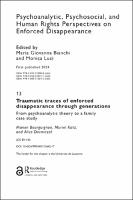Chapter 13 Traumatic traces of enforced disappearance through generations
Proposal review
From psychoanalytic theory to a family case study
Author(s)
Bourguignon, Manon
Katz, Muriel
Dermitzel, Alice
Language
EnglishAbstract
Enforced disappearance is a crime against humanity that impacts the direct victim as well as their relatives and society through generations. Relying on psychoanalytic theory, we will explore the theme of the transgenerational transmission of trauma. We illustrate the complexity of this process with a family case study: a mother and her child coping with the disappearance of her brother during a period of dictatorship in a Latin American country. We demonstrate that the traces of the trauma endured by the relatives of the disappeared are caused by the state violence and the ambiguous loss of the person who was disappeared. These traumatic traces make the communication within a family very complex. The marks of this traumatic family history can be found in the child’s anxiety. This case illustrates the conscious and unconscious pact within the family group, and the way traces of state violence can be passed down through generations. Even forty years after the disappearance, time seems suspended. The persistent impunity hinders the recognition of the crime but also the work of elaboration and reparation for victims and for the second generation. Unresolved questions remain through the generations and they are passed on.
Keywords
Trauma, enforced, disappearance, psychoanalytic theory, disappearance, humanDOI
10.4324/9781003312642-17ISBN
9781032320588, 9781032320571, 9781003312642Publisher
Taylor & FrancisPublisher website
https://taylorandfrancis.com/Publication date and place
2024Grantor
Imprint
RoutledgeClassification
Human rights
Psychology
Psychoanalytical theory (Freudian psychology)


 Download
Download